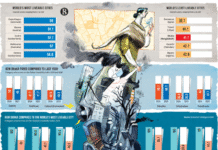Andre Damon and Barry Grey
Over the past month, the world has been gripped by a proliferation of crises—economic, geopolitical, social—erupting on a daily basis, interacting with each other, and raising the spectre of a global calamity.
On the economic front, international financial markets have swung wildly between massive gains and losses, as governments and central banks have sought desperately to counter the impact of a gathering slump in production and investment that threatens to topple the financial house of cards built up since the Wall Street crash of 2008.
The Chinese economy, world capitalism’s premier cheap-labour platform, which provided the bulk of economic growth after the financial crash, is foundering, along with a host of other so-called “emerging market economies.”
Disasters produced by imperialist wars
On the geopolitical front, tensions between the major capitalist powers are sharpening under the impact of social disasters produced by imperialist wars that have ravaged entire countries, from Afghanistan to Iraq, Libya, Syria, Yemen and large parts of Africa. The ruination of much of Central Asia and the Middle East by US imperialism and its European and Gulf allies has unleashed a flood of desperate refugees on a scale not seen since the end of World War II.
Hundreds of thousands of migrants pouring into Europe have exposed the chasm between the solidarity and support for the refugees felt by broad masses of people and the indifference and inhumanity of governments both inside and outside of Europe. The crisis has simultaneously intensified the conflicts that are tearing apart the European Union.
Washington’s diplomatic, military pressure on Russia and China
Washington has escalated its diplomatic and military pressure on Russia and China amid new calls for all-out war to overthrow the regime of President Bashar al-Assad in Syria.
Around the world, the traditional parties of bourgeois rule, both right and “left,” are collapsing under the pressure of unprecedented levels of social inequality and mounting popular anger and discontent. The ruling elites cast about for new means to suppress the class struggle and pre-empt the development of an independent political movement of the working class. They increasingly rely on pseudo-left parties—Syria, the German Left Party, the French New Anti-capitalist Party, the International Socialist Organization in the US—to politically disarm the working class and provide them time to impose their reactionary policies.
Some sections of the ruling class toy with the promotion of authoritarian and fascistic figures basing themselves on racist and anti-immigrant demagogy. Others experiment with “left” forces—Tsipras in Greece, Corbyn in Britain, Sanders in the US—to contain and dissipate popular opposition and prepare the ground for a violent settling of accounts with the working class.
Crisis is not the exception, but the rule. The very speed of events, with virtually no intervals of calm between the storms, denotes an intensifying and profound general crisis.
All of these developments are manifestations of a historic crisis of the economic and political system of capitalism. Within the framework of capitalism, based on private ownership of the means of production and the division of the world into rival nation-states, there is no rational or progressive solution.
The bourgeoisie itself is hopelessly divided—except when it comes to imposing its crisis on the backs of working people. It thrashes about in perplexity, in the end opting for desperate and violent measures. If the fate of mankind is left in its hands, the inevitable outcome will be a third world war and nuclear annihilation.
The world political situation increasingly assumes the form of the 1930s. As Leon Trotsky wrote in 1938 in the Transitional Programme, the founding program of the Fourth International, “Under the increasing tension of capitalist disintegration, imperialist antagonisms reach an impasse at the height of which separate clashes and bloody local disturbances (Ethiopia, Spain, the Far East, Central Europe) must inevitably coalesce into a conflagration of world dimensions.”
Trotsky coined the phrase “death agony of capitalism” to denote the nature of the epoch—our epoch today. The cascading expressions of economic, geopolitical and social crisis were, he explained, characteristic of a pre-Revolutionary state of society. The resistance of the masses grows in opposition to increasing poverty amidst obscene wealth at the top, along with mounting repression and the looming threat of world war.
The central and urgent question posed before mankind, Trotsky insisted, was the development of the political consciousness of the working class and the building of revolutionary leadership. Then, as now, the fate of humanity was concentrated in the question: Which would develop more rapidly, the descent of capitalism into barbarism and war or the politically conscious struggle of the international working class for socialist revolution?
For the latter to triumph, the working class must have a party at its head that bases its program, strategy and tactics on the lessons of the strategic experiences of the working class in the 20th and opening years of the 21st century. This is the indispensable ingredient for the successful overthrow of the bankrupt capitalist system and establishment of socialism.
The Transitional Program begins with the profound assertion: “The world political situation as a whole is chiefly characterized by a historical crisis of the leadership of the proletariat.” This sums up the essence of the situation today, and poses the task before class-conscious workers and youth of building the International Committee of the Fourth International as that world leadership.
Source: Weekly Holiday









